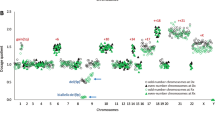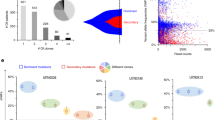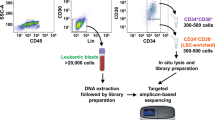Abstract
Single-colony karyotyping (SCK) and reverse-transcription polymerase chain reaction (RT-PCR) are two increasingly used techniques for the quantification of leukemic colonies generated by chronic myelogenous leukemia (CML) cell fractions purged or selected in vitro. Recently, the existence of Philadelphia (Ph) chromosome positive progenitors with a silent BCR-ABL gene has been reported, thus raising concerns on the use of RT-PCR for detecting BCR-ABL positive progenitors. In order to investigate this issue further, colonies (n = 204) generated by mononuclear (MNC) or CD34+ CML cells were individually harvested, divided into two aliquots and analyzed both at the cytogenetic level to detect the Ph chromosome, and the molecular level to detect BCR-ABL transcripts. The mean (± s.d.) percentages of colonies analyzable by either SCK or RT-PCR were 74 ± 16% and 86 ± 16%, respectively. A significant percentage of colonies (67 ± 19%) could be successfully analyzed by both SCK and RT-PCR. Although the majority of these colonies (97 ± 5%) were Ph-positive and BCR-ABL-positive, a negligible percentage (4%) of progenitors were Ph-positive but BCR-ABL-negative. In order to test the influence of colony size on the outcome of molecular analysis, the efficiency of our RT-PCR assay in detecting BCR-ABL transcripts was investigated by means of experiments in which the number of cells used to start RNA extraction was serially reduced. These experiments showed that at least 150 cells were necessary to achieve a reproducible amplification of BCR-ABL transcripts. By correlating the size of harvested colonies with the outcome of molecular analysis, it was evident that BCR-ABL-negative but Ph-positive colonies represented false negative results occurring when a number of leukemic cells below the detection limit of our RT-PCR assay was analyzed. In conclusion, our data demonstrate that individual CML colonies grown in semisolid culture assays can be indifferently analyzed by SCK or RT-PCR, and support an extensive use of a carefully standardized RT-PCR assay to estimate the leukemic burden within samples which have been purged and selected in vitro.
This is a preview of subscription content, access via your institution
Access options
Subscribe to this journal
Receive 12 print issues and online access
$259.00 per year
only $21.58 per issue
Buy this article
- Purchase on Springer Link
- Instant access to full article PDF
Prices may be subject to local taxes which are calculated during checkout
Similar content being viewed by others
Author information
Authors and Affiliations
Rights and permissions
About this article
Cite this article
Savoldo, B., Sammarelli, G., Dotti, G. et al. Reverse transcription polymerase chain reaction is a reliable assay for detecting leukemic colonies generated by chronic myelogenous leukemia cells. Leukemia 12, 434–440 (1998). https://doi.org/10.1038/sj.leu.2400942
Received:
Accepted:
Published:
Issue Date:
DOI: https://doi.org/10.1038/sj.leu.2400942



